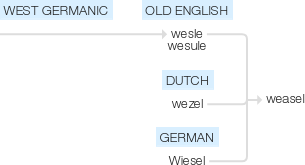Weasel
Old English wesle, wesule, of West Germanic origin; related to Dutch wezel and German Wiesel .
wiktionary
From Middle English wesele, from Old English weosule, from Proto-West Germanic *wisulā, from Proto-Germanic *wisulǭ. The verb comes from the supposed cunningness of the weasel.
etymonline
weasel (n.)
Old English weosule, wesle "weasel," from Proto-Germanic *wisulon (source also of Old Norse visla, Middle Dutch wesel, Dutch wezel, Old High German wisula, German Wiesel), probably related to Proto-Germanic *wisand- "bison" (see bison), with a base sense of "stinking animal," because both animals have a foul, musky smell (compare Latin vissio "stench"). A John Wesilheued ("John Weaselhead") turns up on the Lincolnshire Assize Rolls for 1384, but the name seems not to have endured, for some reason. Related: Weaselly.
weasel (v.)
"to deprive (a word or phrase) of its meaning," 1900, from weasel (n.); so used because the weasel sucks out the contents of eggs, leaving the shell intact. Both this and weasel-word are first attested in "The Stained-Glass Political Platform," a short story by Stewart Chaplin, first printed in Century Magazine, June 1900:
"Why, weasel words are words that suck all the life out of the words next to them, just as a weasel sucks an egg and leaves the shell. If you heft the egg afterward it's as light as a feather, and not very filling when you're hungry; but a basketful of them would make quite a show, and would bamboozle the unwary."
They were picked up at once in American political slang. The sense of "extricate oneself (from a difficult place) like a weasel" is first recorded 1925; that of "to evade and equivocate" is from 1956. Related: Weasled; weasling.
